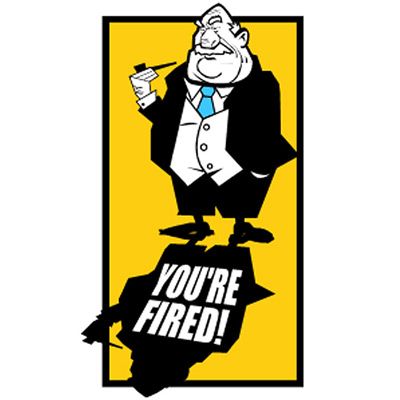
This installment in the “Self-Taught MBA” series ends on a sad note-the worst moment in employer-employee relations: the hostile breakup. Firing someone is not the same as laying someone off. When you lay off employees, it’s because you have no work for them to do, or can’t continue paying their salaries. The employees become eligible for unemployment insurance, and they can usually use you as a reference for another job.
You only fire employees when they have performed very poorly or when they have violated company policies, such as by consistently disregarding safety procedures.
When you fire employees, they are not eligible for unemployment insurance (although they can and will contest this) and will likely not be able to use you as a reference. I had to fire someone very recently for theft. It was devastating because he was an essential, trusted, and well-liked employee with a bright future. His abrupt departure created holes in our organization that had to be filled by others. He repaid the money, and it was tempting to forgive him, but after a moment’s thought, I said no. Not only was the employee fired, but we reported the crime to the police. Forgiving unacceptable behavior in one employee creates a poor precedent for all.
Set the rules
To have legal grounds for firing, you need clearly stated rules. These should be outlined in your company’s hiring contract or employee manual. You can purchase an editable employee manual online or at an office store. The basic rules can include dress code, drug and alcohol policies, smoking, sexual harassment, customer relations, etc. Some violations, such as showing up late for work, may have a degree of tolerance built in, with a second or third chance following a stern, but temperate warning from the supervisor. Only the most egregious or consistent violations will lead to forceful separation. Violations such as theft, however, require immediate severance.
Fire without anger
Although it’s hard to do, I highly recommend that you reserve this most distasteful part of the job for yourself. It emphasizes that you have the final authority, that you are not cowardly, and that you will defend the company. You’ll also be the last to know something your other employees either observed or suspected. When you fire, always fire face to face, and never with anger. Don’t procrastinate; do it right away. As soon as the employee walks into your office, state what you’ve decided: “Frank, I’m sorry to say this, but you no longer have a job here.” Forgive the individual personally, but explain clearly why you decided to fire him based on his performance or his violation of policies or criminal laws.
Although you may feel personally aggrieved, this is a business relation and should be handled coolly and professionally. The employee may not have read this blog, however, and his reaction may not follow the rules of decorum–although I have found that employees generally know what’s coming and accept the consequences. If anything, they react later.
Keep it short. Control the meeting. Explain to the employee that you understand his feelings and hope that he will understand how difficult this is for you, but that nothing will change your mind and so there is no point discussing it. If the employee wants to make a series of statements, encourage him to write you a letter. But conclude the meeting within 15 minutes. This is not a trial; it is the sentencing. If you had a dialogue, it took place before this moment.
Establish procedures, and document
Even if you handled the moment perfectly, this may not be the last encounter with your ex-employee. Some will sue. I have found that the courts favor employees to bosses. If you want your decision to have a strong legal basis, you will have to prove that you did not act arbitrarily or for personal reasons, and that the behavior seriously violated company rules or the law.
Since you have rules set out in your employee manual, you have an objective basis for your decision. You must remain consistent, however. You cannot forgive one employee and fire the next for the same violation. This sounds logical, but it’s hard to do in practice because you have favorite employees and maybe have hired a friend or a relative. In some cases, the consequences of firing make it easier to forgive. This is a mistake. Your other employees will notice, and when you subsequently fire another, get ready for the legal summons because you will get sued, and you will pay an indemnity.
This is why larger companies have personnel departments. The hiring, motivating, disciplining, and severance of humans represents one of the most challenging aspects of running a business.
I would like to hear your war stories about stressful separations and about the lessons you’ve learned from them.
Fine Homebuilding Recommended Products
Fine Homebuilding receives a commission for items purchased through links on this site, including Amazon Associates and other affiliate advertising programs.

Affordable IR Camera

8067 All-Weather Flashing Tape

Reliable Crimp Connectors
























View Comments
Great piece, Fernando. Fortunately the few people I've had to fire weren't terribly surprised and didn't sue. But I could use to tighten up.
"... it was tempting to forgive him, but after a moment's thought, I said no."
You can still forgive him. Doing so simply acknowledges he is human, like the rest of us. We are all capable of screwing up. Firing him and reporting him to the police acknowledges that, as a human, he has to take responsibility for his actions. Both are compatible.
Really good piece. Thanks.
I am surprised how many humane comments I've heard in response to this topic, all along the lines of cdekorne's reply, which carry almost a spiritual overtone, thank you by the way. Employers seem to regard this as a highly moral issue, and not simply a practical one. One employer replied on LinkedIn, and I have asked permission to copy his comments here. He talks about the opportunity for personal and corporate growth, as firing represents a chance for the employee to understand himself, his needs and motivations, and for the company to perfect its policies and procedures. To do precisely what DancingDan expresses so succinctly, "tighten up."
Dave Taylor, President at Taylord Designs LLC, wrote the following, thoughtful comments on LinkedIn. I post here with his permission:
Firing a employee is not something you do lightly. Reasons for firing are numerous but all boil down to failed expectations of performance and agreement to operating values. While firing is hard for employee it is also hard for manager who has developed a relationship with employee! Managers have to realize that a change in relationship is a chance for both parties to grow emotionally. Employee has now been given the chance to experience life choices and find what they truly want to do, companies then are given the chance to refresh their values and review policies. Personnel that are affected are co-employees who then will either support the decision or look to change themselves. The termination should be a stepping stone for all parties but always done to respect feelings with compassion!
Anthony LoCoco, owner of Traditions Home Improvement Service, LLC in Chicago writes:
Having to fire an employee in many cases is a direct result in organizational leadership, vague protocols, non-existent chain of command, hiring a person for a position just created or not giving the employee the tools they need to complete their assigned objectives. I am not saying there are not instances where the employee just fails at every clearly defined task, refuses to set their alarm clock etc.
When you apply to an organization and every other sentence in the job description is "or as directed buy assigned supervisor." or similar wording that is a clear sign of a lapse in communication, disconnect of leadership or unrealistic expectation levels.
I remember some time ago meeting with a firm that was complaining about slippage in their revenue stream in regards to project cost over-runs. They also complained about not being able to find a Production Manager worth a damn. After some investigation I found that sales was over-promising, not defining the extra/change order policy and that in nearly every case the blueprint and written scope of work nearly looked like two different projects. On one the scope called out for 15 can lights with no dimmers, the print had 9 with one dimmer, switched outlets, low voltage and three ways also did not match. When it can't be built correctly on paper you are doomed once labor arrives and tries to start, finish on time, within budget and make it as seamless of a process for the client as possible.
The company owners response was, "That's how we have done it for 30 years and it has always worked fine." - REALLY.
Can you all say D-I-N-O-S-A-U-R.
By Anthony LoCoco
Joseph Hughes, at Contractor Dynamics, wrote the following, somewhat provocative comments on LinkedIn. I post here with his permission:
In my first career, I learned a simple but powerful heuristic from the owner for whom I worked: 'Everyone on your team is either an asset or a liability.' The simplicity of the statement can sound crude, but the message is clear. A person on your team is either helping the company move in a positive forward direction, or he is not. If he is not, it's time to part ways.
Curious what other think. Is this too simplistic?
By Joseph Hughes
Dave Taylor writes: My best employee has seven felonies, old history, but he is 150% tuned to the job always and very few problems! The bible says don't judge lest you be judged, many have forgotten these teachings which cross many religions.
By Dave Taylor
Anthony LoCoco responds:
Joseph Hughes, I've heard that saying a lot in my career. Although it is simplistic and will not direct this to you or your boss since I dont know either of you, I will say that in my experience it was said by the worst leaders I've had overall. I try to avoid bumper-sticker management, management by crises or basically anything out of "The Five Minute Manager". Sure sometimes you know right off the bat if someone is going to make it or not, but in those cases the obvious failures are more a poor decision by those doing the hiring. IF they had invested the time and resources to vet folks out and/or match them to a better role the degree of failure would be greatly diminished.
I have had the opportunity to review applicants and meet with folks who were in a cursory glance were not given the chance to convince my of their abilities. Higher ups sometimes pigeon hole applicants based on their own dare I say prejudices. I've found the "ugly-ducklings" that no one wanted to take to the dance and sure I've had a few disappointments but probably 75% of the time they end up being the best employees I've had. I saw things in them that at the time they did not in many cases see in themselves. But in the seat of power the big bosses looked at them in a one-dimensional point of view..."a liability" that they were convinced would fail.
By Anthony LoCoco
Joseph Hughes writes:
@Anthony I appreciate the feedback and am not saying I advocate bumper-sticker management (great term, by the way!). I don't judge people straight away. I was talking about facing the decision of whether to keep an employee or let him go (after a reasonable period of time when you've had a chance to see him in action). Too many business owners avoid firing because it's the comfortable thing to do. They don't want to put themselves or the employee through the pain. At this point, it's helpful to ask the asset/liability question, because as a small business owner, time and money are your most valuable resources, and an employee that is producing drag on your business is wasting both.
By Joseph Hughes
On the note of forgiveness: I wholly believe that a boss should be able to come to a point of forgiveness for whatever grievance was made by the employee. However, I think that people tend to forget that forgiveness does not absolve someone from the natural consequences of their actions. I agree with Fernando that firing someone while calm, and even after having forgiven them, is the correct and healthy way to approach the situation. It is also the most painful.
You don't get to hide behind anger, shouting and all the other hoopla that comes with reacting in emotion and causing a scene. And even though that sounds childish, it's human nature to want to avoid the uncomfortable things in life. Sometimes, it just sucks to be the boss.